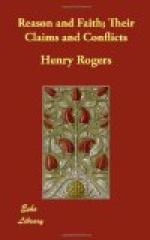if treated on the principles of criticism which his
countryman has applied to the Evangelists, might not
be proved a mere mytholographer ... ‘It
is plain’, he says, ’that if absolute
among historians’—and still more absolute
apparent agreement—is necessary to assure
us that we possess in their writings credible history,
we must renounce all pretence to any such possession.’
The translations from Quinet, Coquerel, and Tholuck
are all, in different ways, well worth reading.
The last truly says, ’Strauss came to the study
of the Evangelical history with the forgone conclusion
that “miracles are impossible;” and where
an investigator brings with him an absolute conviction
of the guilt of the accused to the examination of
his case, we know how even the most innocent may be
implicated and condemned out of his own mouth.’
In fact, so strong and various are the proofs of truth
and reality in the history of the New Testament, that
none would ever have suspected the veracity of the
writers, or tried to disprove it, except for the above
forgone conclusion—’that miracles
are impossible.’ We also recommend to the
reader an ingenious brochure included in the ‘Voices
of the Church, in reply to Strauss,’ constructed
on the same principle with Whately’s admirable
‘Historic Doubts,’ namely; ’The
Fallacy of the Mythical Theory of Dr. Strauss, illustrated
from the History of Martin Luther, and from the actual
Mohammedan Myths of the Life of Jesus.’
What a subject for the same play of ingenuity would
be Dean Swift! The date, and place of his birth
disputed—whether he was an Englishman or
an Irishman—his incomprehensible relations
to Stella and Vanessa, utterly incomprehensible on
any hypothesis—his alleged seduction of
one of one, of both, of neither—his marriage
with Stella affirmed, disputed, and still wholly unsettled—the
numberless other incidents in his life full of contradiction
and mystery—and, not least, the eccentricities
and inconsistencies of his whole character and conduct!
Why, with a thousandth part of Dr. Strauss’s
assumptions, it would be easy to reduce Swift to as
fabulous a personage as his own Lemuel Gulliver. +Any
apparent discrepancy with either themselves or profane
historians is usually sufficient to satisfy Dr. Strauss.
He is ever ready to conclude that the discrepancy
is real, and that the profane historians are right.
In adducing some striking instances of the minute
accuracy of Luke, only revealed by obscure collateral
evidence (historic or numismatic) discovered since,
Tholuck remarks, ’What an outcry would have
been made had not the specious appearance of error
been thus obviated. Luke calls Gallio proconsul
of Achaia: we should not have expected it, since
though Achaia was originally to senatorial province.
Tiberius had changed it into an imperial one, and the
title of its governor, therefore, was procurator;
now a passage in Suetonius informs us, that Claudius
had restored the province to the senate.’
The same Evangelist calls Sergius Paulus governor




